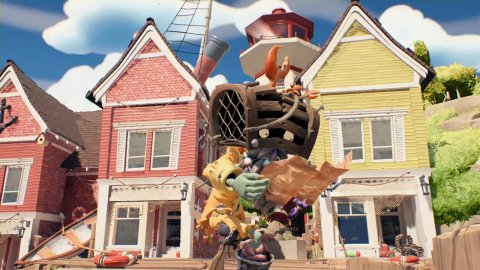
Plants Vs. Zombies
PopCap CEO Melvin Teo talked about the technical difficulties the studio faced in bringing Plants Vs. Zombies: Battle for Neighborville to Nintendo Switch. Despite the "minor caliber", the game is the first to use the Frostbite engine on the Nintendo console. An engine definitely unwilling to run on machines with limited power, so much so that the game initially ran at 2-3 frames per second.Despite this, the studio managed to squeeze the Nintendo hybrid console that now is able to handle this fun shooter quite successfully. Achieving these results, however, must not have been easy. The Frostbite, the engine that beats in almost all EA productions, has always been famous for being quite demanding in terms of hardware, as well as recalcitrant in terms of optimization.
For this reason the studio asked the technical collaboration of QLOC SA., the studio specialized in Switch conversions that created the ports of Hellblade: Senua's Sacrifice and Dragon's Dogma: Dark Arisen. Thanks to them they managed to get around the 4GB RAM limit of the Nintendo platform.
"It was a huge technical feat: I remember when we tried to launch the game for the first time. It ran at 2 or 3. frames per second, it was a slideshow. We realized we had a lot of work to do ".
" So we had to make a lot of engineering decisions and optimizations to ensure a constant stream of 30 frames per second without compromising quality visual of the game ", concluded Melvin Teo.
Now, however, the engine is officially compatible with the Nintendo console. Who knows if this means that other EA games can be converted for the console.
Source
Plants Vs. Zombies Could Pave The Way For Bigger And Better EA Frostbite Titles On Switch
One announcement during Nintendo's recent Direct presentation that perhaps didn't get enough attention was Plants Vs. Zombies: Battle for Neighborville Complete Edition. It's EA's 'first-ever' Frostbite engine game to be released on the Switch.
In a recent interview with the How Games Make Money podcast, hosted by VentureBeat's Jeff Grubb, the game's producer Melvin Teo spoke about the many challenges the team at PopCap had to overcome to bring the game to Nintendo's platform.
“It was a massive technical undertaking. I remember when we first started and we managed to get the game to boot up and run. And it hit like 2 or 3 frames per second. It was a slideshow, and we had a lot of work to do.'
To help make the entire process easier, PopCap called on the support team and port studio QLOC SA. While this name might not be instantly recognisable, this is the same company that previously worked on the Switch ports of Dragon's Dogma: Dark Arisen and Hellblade: Senua's Sacrifice.
The system's 4GB of RAM was apparently one of many limitations, but in the end, the team was able to overcome problems like this with 'smart engineering decisions and optimizations', according to Teo. This also ensured the game ran at 'a steady 30 frames per second' and at the same time didn't comprise the visuals - keeping the 'charm and quality' of PVZ intact.
With PVZ now successfully ported to Nintendo's latest platform, it could potentially lead to bigger and better versions of FIFA.
EA in the past has excluded certain content from the Nintendo 'Legacy' versions of FIFA (like 'The Journey') because these builds weren't running on the latest engine. Some other Frostbite-powered series that were out of the question until now include Battlefield, Star Wars and titles like Madden.
What would you like to see next from EA now that the Frostbite engine is up and running on the Switch? Will you be picking up Plants Vs. Zombies when it's released on 19th March? Leave a comment down below.